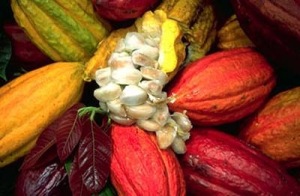Who can say no to Fair Trade, kosher for Passover chocolate? Fair Trade Judaica is generously giving-away chocolate to one lucky reader! Enter to win by March 20, 2015 by writing in the comments section, at the bottom, about why Fair Trade kosher for Passover chocolate is important to you.
You might be wondering, what does “Fair Trade” mean and why should I care about it, especially at Passover? The holiday is an opportunity to re-examine the enslavement of people in our food supply chains. The majority of cacao is grown in West African countries, such as Cameroon, Ghana and Cote d’Ivorie. Hundreds of thousands of children—sometimes as young as five—work in the fields where they are exposed to pesticides and perform strenuous work. Some of these children are enslaved and 40% of them don’t go to school.
Fair Trade grown, harvested and processed products, such as cacao, are done without child labor. The adult workers are paid fair wages and provided good work conditions. It’s a model that provides economic empowerment to individuals and local communities, is more environmentally sustainable and encourages smaller-scale agriculture and food production. This makes final products that are sweeter for both consumer and workers.
Through its “Bean of Affliction: Chocolate, Child Labor and Fair Trade” campaign, Fair Trade Judaica (FTJ) “is building a fair trade movement in the Jewish community, linking Jewish values of human dignity, self-sufficiency, and environmental sustainability with fair trade standards assuring fair and livable wages, no child labor, healthy and safe working conditions.” Kosher for Passover chocolate is part of the Jewish Fair Trade Partnership with Equal Exchange, in partnership with T’ruah: the Rabbinic Call for Human Rights.
The FTJ give-away includes three chocolate bars that are:
-Fair Trade
-Certified kosher for Passover by Rabbi Aaron Alexander (Assoc Dean at Ziegler School of Rabbinic Studies at American Jewish University)
-Pareve
-Vegan
-Soy and gluten free
Enter by simply writing a comment about what Fair Trade kosher chocolate means to you for Passover, below (US residents only) by March 20, 2015. FTJ will choose a random winner who will receive the package before Passover.
Submissions include permission for their comments to be used publicly. I strongly support the work of FTJ and haven’t received any compensation for this give-away. The product was donated by FTJ.
And whether or not you win, check out FTJ resources to “Fair Trade” your Passover.
B’hatzlacha!
Congratulations to the winner, Joanna Arch!




Fair trade Kosher Chocolate for passover means to me… REDEMPTION!
LikeLike
Chocolate production is often an example of modern day slavery, and I can’t think of a better time to stand up against it than during Passover!
LikeLike
Fair trade kosher chocolate because “fair trade” “kosher” and “chocolate”. What else needs be said?
LikeLike
God bless re this story Where are you now ? XO Sari
Sent from my iPhone
>
LikeLike
means redemption
LikeLike
Free Trade chocolate represents a shift from child labor that is toxic to child labor that is delicious. Blessings to the children of Africa who now can improve their lot, and hopefully they nibble a bit of chocolate each day to remember that life is sweet.
LikeLike
Fair trade chocolate on Pesach extends the possibility of freedom (to pursue education, to be children who have time to play) to those who are among those most in need of it.
LikeLike
Having Fair Trade kosher chocolate available means feeling good about my most favorite foods during a time when I’m being my most mindful about what I eat. Thank you for making it!
LikeLike
The best chef faculty teaching vegetarian and other food preparation courses teach that one should never prepare food in an unhappy or angry mood. The food will never turn out properly.
One must make food with a great amount of love that transmits to others and the ultimate recipients. This applies to why we need Fair Trade standards, so that the makers can be recognized for their efforts, appreciated, and paid fair wages. Pride and appreciation in work is essential.
LikeLike
Fair trade chocolate is an example of an area where slavery was considered the norm, but is slowly starting to change with education, information, and the desire for fair and good. To me it reminds me of a time where the impossible began to seem possible and the just triumphed, while reminding me that as much progress as has been made here is. It’s to do a d regular remaindered of where we came from and where we are trying to go is imperative.
LikeLike
Free trade chocolate tastes like freedom!
LikeLike
I’m not Jewish, but to me Fair Trade chocolate is important because the very label “fair trade” automatically puts the person enjoying it in a more mindful place. It’s a good reminder to be present in everything we consume.
LikeLike
The issues that you raise transcends all religions. Fair Trade makes the chocolate all the sweeter and the lives of people at the grass roots better.
LikeLike
Thank you for making us aware that while we are enjoying delicious chocolate thousands of children are enslaved in the process of gathering and making chocolate. This observation makes Fair Trade all the more relevant to buy products that enhance people’s lives not destroy them.
Shame on those profiting from their difficult labor.
LikeLike
All who are hungry for justice (and really good chocolate) let them come eat!
LikeLike
Guilt-free chocolate? Sign me up!
LikeLike
Whenever I buy coffee or chocolate, I buy Fair Trade, or try to determine in some other way that the seller or importer is in a relationship with the producers and workers that doesn’t exploit them. As a lifelong worker and member of several unions along the way, including the Courtesy Clerks Union, ASCME, and the Writers Guild of America, the dignity, well-being, and fair treatment of workers is of utmost importance to me. It’s a moral issue. Unions have grown weaker over past three decades in the US. The disadvantageous position this circumstance has put US workers in is only now beginning to bear a backlash.
Not long before my grandmother died, I sang her the socialist love song, “Mayn Rue Platz,” and she remembered when the Labor Zionists who had helped her survive a pogrom in Belarus taught her the song. Jewish solidarity with workers goes back continuously from now to the days of bondage in Egypt. As Bernard Malamud said, in The Fixer, “There is no such thing as an apolitical man, especially an apolitical Jew.” I might be paraphrasing that, but the sentiment is correct.
We are not just for ourselves. As a people, our concerns, like the paths of our historic travels, cross cultures and ethnicities. No chocolate is kosher if its production history is immoral. Chocolate is only as sweet as the labor of those who work to bring it from where it grows to our table.
LikeLike
Looking at the amount of comments (recored breaking?) it becomes obvious that you do something right. Well done!
LikeLike